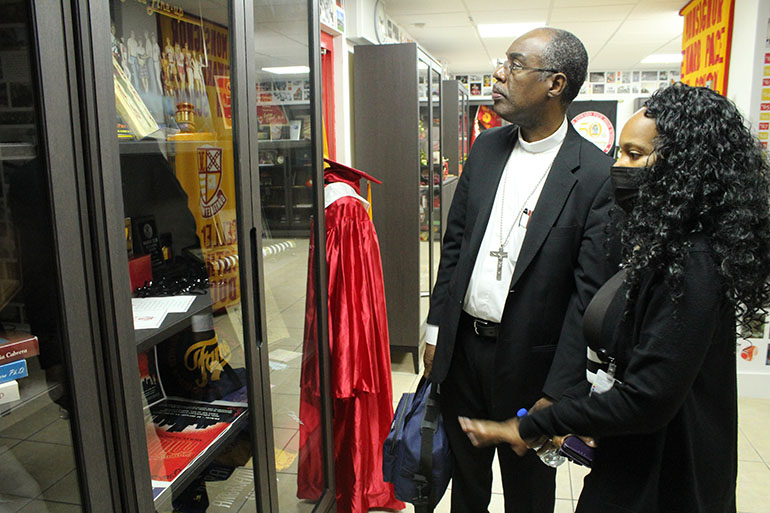By Cristina Cabrera Jarro -

Photographer: CRISTINA CABRERA JARRO| FC
Bishop Charles Peters Barthélus of Port-de-Paix, Haiti, gets a tour of Heritage Hall at Msgr. Edward Pace High School in Miami Gardens on Sept. 14, 2022. Accompanying him is Pace teacher Mammone Onelien, who also served as translator during his visit. Port-de-Paix is the Archdiocese of Miami's sister diocese. Pace is one of several schools in the archdiocese that fundraises year-round to help schools and churches in Port-de-Paix.
MIAMI | After several weeks of protests against the rising price of petroleum, unrest continues in Haiti, and has moved from desperation to violence.
In September 2022, several humanitarian and relief institutions, including Caritas (Catholic Charities), Food for the Poor, the Haitian Red Cross, and more, were looted and vandalized; some even burned. Local staff from the Haitian press organization, Vant Bèf Info, reported that the Departmental Emergency Operation Center located in Morne Caillot, Port-de-Paix, had everything stolen, from solar panels, chairs, and office equipment to even a custodial mop.
Gangs possibly responsible for the looting have become a serious problem in the country.
“Some of the gangs were paid for by people in politics and others. Whether they control the gangs now is another question,” said Archbishop Thomas Wenski, who last visited Haiti in October 2018.
Since Bishop Charles Peters Barthélus was appointed bishop of Port-de-Paix in 2020, he has maintained email correspondence with Archbishop Wenski. Over 30 years ago, the Archdiocese of Miami established a sister diocese relationship with the Diocese of Port-de-Paix in northwest Haiti — the poorest region of that country — a relationship which continues today through the work of the lay missionary group, Amor en Acción.
On his way back to Haiti from Rome in mid-September 2022, Bishop Barthélus visited Miami and met with Archbishop Wenski, representatives of Amor en Accion, and others. The archbishop said parishioners of Notre Dame d’Haiti Mission in Miami were overjoyed to have the Haitian bishop celebrate Mass.
“In Miami, we have a large contingency of Haitians that come from the Diocese of Port-de-Paix. The majority of people in Notre Dame d’Haiti are from that region of Haiti,” the archbishop said.
Bishop Barthélus also visited St. Gregory the Great Church and School in Plantation,St. David School in Davie, Msgr. Edward Pace High in Miami Gardens (see related story), and St. Thomas University in Miami Gardens.
Bishop Barthélus’ return to Haiti was delayed when the airport in Port-au-Prince closed due to the violence in the country. Then it took him another two weeks to access safe transportation to Port-de-Paix.
“In general, the northwest, where Port-de-Paix is, was virtually unscathed for many, many years,” said Andres Novela, former president of Amor en Accion’s board, and director of campus ministry and theology teacher at Pace High.
“All those little villages and towns that were sort of living relatively peacefully —not an ideal existence because of all of the struggles, but peacefully — and on their own, taking care of business, now they have gangs overrunning them. They burn their houses, churches, and they loot,” he said.
Earlier this year, three of Bishop Barthelus’ priests were kidnapped and held for ransom because, as Novela pointed out, “they know the Church will pay.”
Even the Caritas location that was ransacked in September needs to consider whether that will happen again before starting to rebuild.
“Otherwise, you’re just in a cycle,” Archbishop Wenski said.
Unlike the current oppressive, Church-persecuting governments in Nicaragua, Venezuela and Cuba, the government in Haiti relies heavily on the Church, although it does not always acknowledge it.
“The Catholic Church provides education, healthcare, and in some rural areas, local Catholic priests are building roads and digging wells,” said Archbishop Wenski.
The Church is pushing for free and credible elections, which it hopes will help return some order to Haiti.
“They’re trying to urge politicians on all ends and political parties to dialogue and cooperate and think of the common good rather than themselves. But it’s quite complicated. Haiti needs help,” Archbishop Wenski said.
HOW YOU CAN HELP
- For more information on how you can help Haiti by supporting Amor en Accion’s missionary work in that nation, visit amorenaccion.com; and follow them on Instagram and Facebook @amorenaccion.

